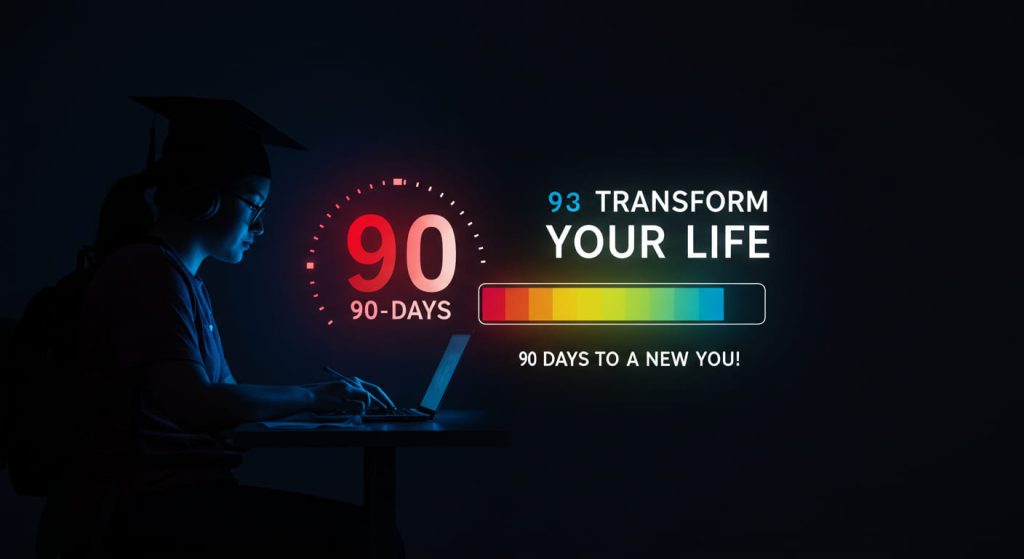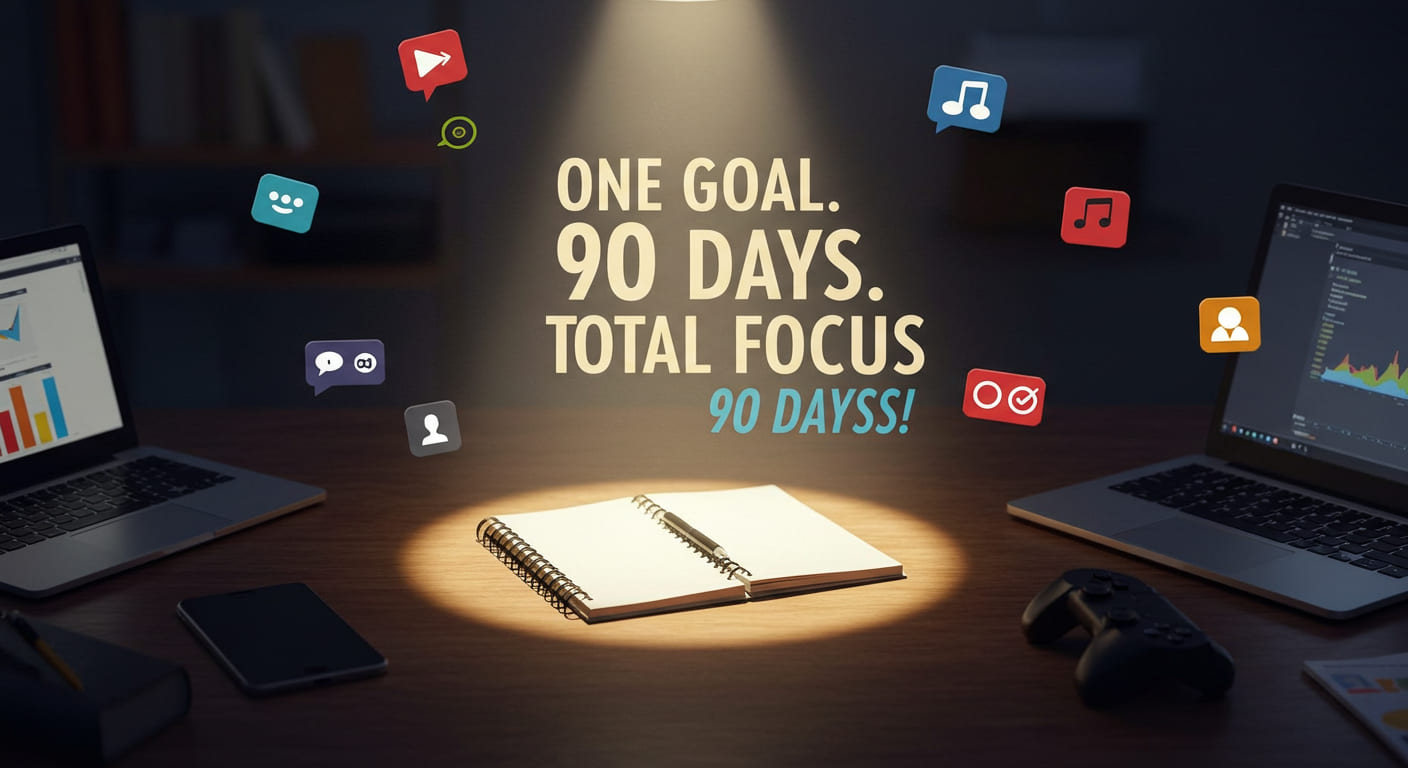Have you ever had the feeling that you are stuck in a perpetual cycle of scrolling through motivational videos, setting new goals for each week, and resolving to study harder or get organized, only to achieve little of the progress you wanted? If so, know that you are not alone. As a student, there seems to be an endless stream of advice bombarding you: read more, meditate, go to the gym, make contacts, and hustle. It is dizzying and to be frank, not getting enough rest makes one burnout. But what if all that energy could be funnelled towards a single, powerful sprint that changes the game? Imagine how far you’ve come if you were to look back after just 90 days. That is the strength that focused effort can yield over a 90-day period, a strategy that has empowered greats like Michael Jordan and Steve Jobs. It can work for you too.
Consider this article a sort of template as it aims to provide a solution that comes in the package of a season setting intense periods of focus and isolation mixed with shifts in the mentality needed to implement actions required to achieve both goals and real change in your personal and academic life. We will outline processes designed to help you prioritize critical factors while sidestepping distractions to create effortless long-term momentum. Are you ready to ditch the moderate results treadmill and supercharge your sprint toward self-improvement? Let’s dive in and prepare to maximize the next 90 days.
Select Your One Thing
Have you ever tried juggling multiple goals at once, such as studying for exams, going to the gym, learning a new skill, socializing with friends, or even starting a part-time job? It is draining, and it diffuses your concentration. The key to breakthroughs is picking one thing to rule over. For you, that might be acing a tough course, mastering a skill such as coding, or constructing a portfolio for your dream internship. Ask yourself: What is one goal that if I crushed would change everything?
With a single priority focus, you are not going to have problems determined what to do. You awake each day knowing what to do the second you get out of bed. One of my students, Priya, decided that her “one thing” goal was to master data analysis for her computer science degree. She reduced her In-Person social time and her television to focus on coding projects. In only 90 days she was able to construct a portfolio that won her a summer internship. She achieved tremendous progress because she had clarity. So, pick your one thing and own it.
Sift the Signals from the Clutter
Every social media platform, to every music genre and every YouTube video are great inputs, but acquiring them does provide any value. During this 90-day sprint, a period of time where you need to double off on productivity, focus on the things that really matter and stop being so aspirational. Deleting Instagram, muting group chats or even stepping away from self-help podcasts, all help. Get rid of everything that does not contribute or serve your primary goal.
In the twenty-first century, multi-tasking is the norm and solitude is an exception. The same focus enabling feature actually becomes a restriction, hence sharpening your mind will provide hundred times better results than indulgence. This simple feet-wash-like approach, clears clutter on and around your desk and throw away anything that doesn’t push you towards achieving your ultimate goal.
Building a Second Brain
Ideas appear out of thin air when you least expect them to – a tutorial you’re watching comes alive with a breathtaking sense tip, or while reading a textbook, you could get motivated to an entirely new project. Don’t make the mistake of trusting your brain to remember all these different things. Instead Build a “second brain” to capture all of these gems that can either make or break you. These could be as simple as Google Docs, Apple Notes or even journals where one can jot down quotes, insights or steps to take.
For example, while in class, whether learning the material or graphic designing, make sure to save links to inspiring portfolios, along with tricks and key notes that stand out on a self-explanatory basis. After getting everything written down, your second brain is guaranteed to bloom into a goldmine of ideas waiting for you to revisit, connect, and act on. It’s like turning future headaches into cheat sheets that guarantee incomprehensible levels of success.
Time Blocking Like A Pro
Being assigned a particular session without prior knowledge on the topic can come hand in hand with a feeling of dread:” Why couldn’t this assignment have been something more entertaining?” All of your worries about being sidetracked can be eradicated with the use of planning. Time blocks your day into chunks with certain dedicates set aside for a particular task; these can be based on studying, skill practice or even breaks. To give you the award-winning example: Set a block for checking emails at 9-9:30 a.m., 11 a.m. while deep studying step out for a small walk, followed by 1-3 p.m. set aside for project work.
Remember Blocks Don’t Need to Be Hour Based> Flexibility is Key
Start by asking: What needs to be done this week for me to achieve my monthly target? What needs to be accomplished today in order to complete the weekly target? Each day add 1-3 will do tasks and follow through as if you are a seasoned expert. Sessions should be treated as obligatory: turn off your phone, shut extra tabs, and resist the compulsion to “quickly check” social media. This part of the routine teaches your body how to switch into focus mode which will make the act of being productive second nature.

Achieve More Focus
Imagine this: you are so involved in studying that hours pass without your knowledge, and you are effortlessly solving difficult problems. That is deep work – the optimal level of concentration without distractions to truly maximize your creative thinking. In order to get into deep work mode, prepare your surroundings for success: turn off notifications, wear noise blocking headphones, and set goals for yourself that are challenging but still within your reach (enough to stretch your skills without causing a mental overload).
A productivity deep work session will likely result in time losing meaning as you enter a flow state. To cultivate these feelings, do not attempt tasks you find overly effortless or overly challenging. If you’re studying mathematics, attach yourself to solving tasks a level or two above your current standing. Watch your levels of progress soar after scheduling 1-hour deep work sessions daily.
Recharge Smart
Unlike machines, the brain requires rest as well as breaks. Not all breaks, however, can be dictated as equal. While taking a breather by gaming or scrolling TikTok can provide a break, these increase the likelihood of a depleted mental state due to dopamine spikes from work, subsequently struggling to refocus afterwards. Alternative “boring” breaks, like a light stretching or 10-minute mindfulness meditation, boost focus and endurance.
To reset the mind, 5-minute breath-focused meditation can be used. Phone-less nature walks help achieve low-stimulus breaks that enhance energy. Returning to deep work becomes easier when coupled with these methods. Saving high-dopamine activities like shows greatly enjoyed will expedite motivation. Work rewards become accessible after completion.
Develop a Skill for the Market
Remember, your 90-day sprint is about more than just improving your grades. It’s achieving mastery in a lifelong skill such as coding, public speaking, data analysis, or graphic design. Skills that are valued in the workplace. A marketable skill will help you get internships, side gigs, or even launch your own startup. More importantly, it is the epitome of self-development because it combines personal growth with tangible change.
Focus on a skill you readily connect with or have some background knowledge of. Ensure that it’s in demand, such as the technology, communication, or creative fields. It should also be quantifiable, positive in nature, and help solve a problem, such as designing applications or data analysis. Hone it during your sprint, and you will walk away with a game-changing tool.
Key Takeaways
- Focus on One Goal: Pick a single priority to channel your energy and skyrocket your progress.
- Cut Distractions: Purge bad inputs like social media and limit even “good” ones that don’t serve your goal.
- Capture Insights: Use a second brain to store ideas and action steps, fueling creativity and clarity.
- Plan Your Day: Time block tasks to stay on track and make productivity a habit.
- Embrace Deep Work: Schedule focused, distraction-free sessions to unlock flow states and maximize output.
- Rest Strategically: Take low-stimulation breaks to recharge without losing momentum.
- Build a Skill: Master a marketable skill to boost your academic and career prospects.
Conclusion: Your Sprint, Your Way
A 90-day sprint isn’t about becoming a robot or cutting out all fun—it’s about giving yourself permission to go all-in on what matters most. Not every student will pick the same goal or follow the same path, and that’s okay. Maybe your sprint is about nailing organic chemistry, launching a blog, or mastering public speaking. The beauty is in the focus—choosing one thing and seeing how far you can go.
As you step into your own season of intensity, remember: you’re not just chasing a grade or a skill—you’re building a version of yourself that’s sharper, stronger, and ready for whatever’s next. So, what’s your one thing? Grab a notebook, pick a goal, and start your sprint today. In 90 days, you’ll look back and think, “I did that.” And trust me, that feeling is worth every ounce of effort.
